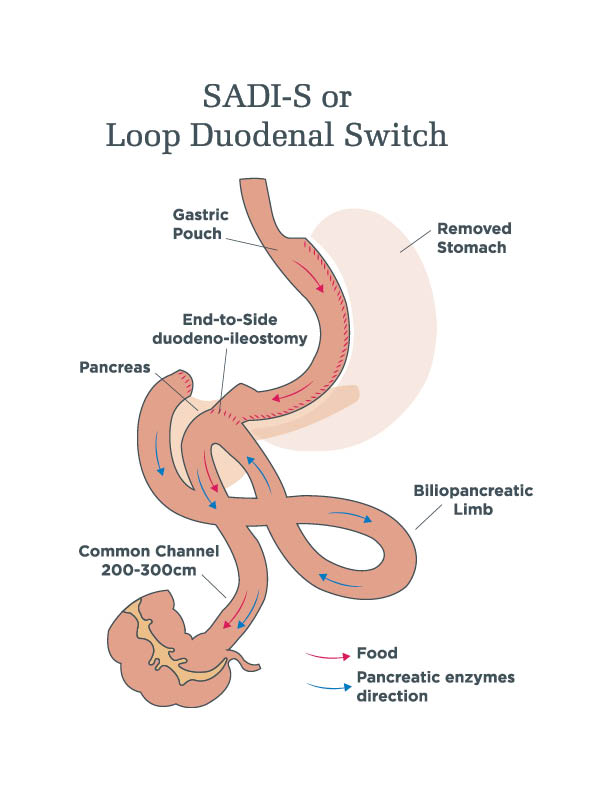
These procedures go by many names. They both involve a sleeve gastrectomy and a modification of the intestines. The original “Classic DS” has been a standard operation for many years, and the modified switch, also known as “SADI-S,” or “Loop DS,” is the newest procedure approved by the American Society of Metabolic Surgery.
How Switch Operations Work
There are four effects: restriction, dumping, reduced appetite and malabsorption. Every individual experiences different degrees of each effect. All of these effects work together to help you drastically reduce the calories coming into your body.
Restriction
The smaller stomach makes you fill up on much less food. For the first few months after surgery, this may be only about a quarter of a cup. As time goes on, people can usually eat about a cup of food.

Dumping
The intestines are much more sensitive than the stomach and this can cause unpleasant reactions to certain types of food. Usually high-calorie foods, such as concentrated sugars and fats, are the type that cause problems. Dumping can include nausea, diarrhea, cramping and low blood sugar. These unpleasant side effects help you stay away from junk food.
Reduced Appetite
There is usually no hunger at all for the first few weeks to months after surgery. Hunger does come back eventually for most people. When it does, hunger is usually less than before surgery and can be satisfied with much less food. As with Sleeve Gastrectomy and Gastric Bypass, switch operations reduce a “hunger hormone” called ghrelin.
Malabsorption
After a switch operation, you will not digest all of the calories in the food you eat. This is a significant part of Switch Operations (SADI-S or Loop Dudodenal Switch and Classic BPD/DS). This is why switch operations have a higher average weight loss than any of the operations, but it is also why the chance of malnutrition is higher.
Switch Advantages (compared to other bariatric operations)
- Higher average weight loss than Sleeve Gastrectomy or Gastric Bypass
- Better chance of controlling diabetes than Sleeve Gastrectomy or Gastric Bypass
- Does not have the ulcer risk of a Gastric Bypass
Switch Disadvantages
- More complex surgery than Sleeve Gastrectomy or Gastric Bypass
- Risk of intestinal obstruction, while rare, is higher than Sleeve Gastrectomy and similar to Gastric Bypass
- Involves malabsorption which means a higher risk of metabolic disorders, diarrhea, vitamin or mineral deficiencies and protein deficiency

